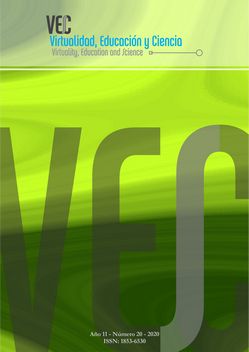The flipped classroom: a challenge for teaching communicative English at the higher level
DOI:
https://doi.org/10.60020/1853-6530.v11.n20.27456Keywords:
flipped classroom; communicative English; teaching proposalAbstract
Within the framework of the research project called Study of English teaching practices in the Faculty of Engineering and Agricultural Sciences of the National University of San Luis and its relationship with the demands of the work environment, we designed a didactic proposal for teaching communicative English for students of the engineering careers of the mentioned university. This proposal will be carried out with the blended modality, applying the teaching model called flipped classroom (Bergmann and Sams, 2012). Such model implies a different way in which the teaching and learning processes happen. Thus, it basically consists of reversing the traditional order of the events that occur inside and outside the class. The objective of this work is to socialize the development of the aforementioned project, its main results and the academic proposal that resulted from the findings.
References
AYUGA-TÉLLEZ, E., GONZÁLEZ-GARCÍA, C. y GRANDE-ORTIZ, M. (2010). Análisis de competencias en el Grado de Ingeniería Forestal para su adaptación al Espacio Europeo de Educación Superior. Formación Universitaria – 3(3), pp. 3-14. Recuperado de: https://scielo.conicyt.cl/scielo.php?script=sci_arttext&pid=S0718-50062010000300002 [10/09/2019]
BERGMANN, J., y SAMS, A. (2012). Flip Your Classroom: Reach Every Student in Every Class Every Day. Washington DC: International Society for Technology in Education. Eugene. pp. 120-190. Recuperado de: https://www.scirp.org/(S(oyulxb452alnt1aej1nfow45))/reference/ReferencesPapers.aspx?ReferenceID=1791200 [12/09/2019]
CONFEDI (2018) Propuesta de estándares de segunda generación para la acreditación de carreras de Ingeniería en la República Argentina “Libro Rojo de Confedi” - Buenos Aires, Argentina, Universidad FASTA Ediciones. Recuperado de
[15/09/2019]
DAVINI, M.C. (2008). Métodos de enseñanza. Didáctica general para maestros y profesores. Buenos Aires: Santillana.
EVSEEVA, A. y SOLOZHENKO, A. (2015). Use of Flipped Classroom Technology in Language Learning. Procedia - Social and Behavioral Sciences (206), pp. 205 – 209. Recuperado de: : https://www.sciencedirect.com/science/article/pii/S1877042815051393 [12/09/2019]
HUNG, H. (2014). Flipping the classroom for English language learners to foster active learning. Computer Assisted Language Learning, 28(1), pp. 81-96. Recuperado de: http://dx.doi.org/10.1080/09588221.2014.967701 [16/08/2019]
LÓPEZ GARCÍA, J. C. (2014). La Taxonomía de Bloom y sus Actualizaciones. Eduteka. En línea: http://eduteka.icesi.edu.co/articulos/TaxonomiaBloomCuadro [11/05/2019]
MARCO COMÚN EUROPEO DE REFERENCIA PARA LAS LENGUAS: APRENDIZAJE, ENSEÑANZA, EVALUACIÓN - Ministerio de Educación, Cultura y Deporte, Subdirección General de Cooperación Internacional, 2002. Recuperado de: https://cvc.cervantes.es/ensenanza/biblioteca_ele/marco/cvc_mer.pdf [16/08/2019]
MARZO NAVARRO, M., PEDRAJA IGLESIAS, M. y RIVERA TORRES, P. (2006). Las deficiencias formativas en la Educación Superior: El caso de las Ingenierías. Cuadernos de Gestión, 6(1), pp. 27-43. Recuperado de: https://www.redalyc.org/articulo.oa?id=274320225002 [10/09/2019]
SALINAS, J., DE BENITO, B., PÉREZ, A. y GISBERT, M. (2018). Blended learning, más allá de la clase presencial. RIED, Revista Iberoamericana de Educación a Distancia, 21(1), pp. 195-213. Recuperado de: http://revistas.uned.es/index.php/ried/article/view/18859 [12/09/2019]
TALBERT, R. (2012). Inverted Classroom. Colleagues, 9(1) Artículo 7. Recuperado de: http://scholarworks.gvsu.edu/colleagues/vol9/iss1/7 [11/09/2019]
TALBERT, R. (2014). Inverting the Linear Algebra Classroom, PRIMUS, 24:5, 361-374. Doi:10.1080/10511970.2014.883457 [11/05/2019]
TOBÓN, S. (2006). Aspectos básicos de la formación basada en competencias. Talca: Proyecto Mesesup.
TRUJILLO, C., PÉREZ CANO, I., y ESSENWANGER, F. (2016). Trabajo colaborativo entre líderes facilitadores en entornos de aprendizaje mixto (Blended Learning). Revista Foro de Profesores de E/LE, (12), pp. 275-284. Recuperado de https://www.researchgate.net/publication
/310258421_Trabajo_colaborativo_entre_lideres_facilitadores_en_entornos_de_aprendizaje_mixto_Blended_Learning [08/09/2019]
Downloads
Published
Issue
Section
License
The generation of derivative works is allowed as long as it is not done for commercial purposes. The original work may not be used for commercial purposes.


